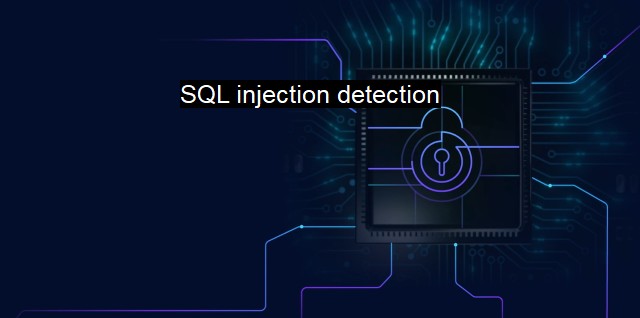What is SQL injection detection?
Preventing SQL Injection Attacks: Understanding the Importance and Methods of Detection for a Secure Application with SQL Database
SQL injection detection is an incredibly vital aspect within the realm of cybersecurity and the development of antivirus software. So, what exactly constitutes SQL injection detection, and why is it a critical feature in protection systems?SQL injection is a code injection technique utilized by attackers to exploit vulnerabilities in a web application's database layer. The attacker uses malevolent SQL statements, hence the term 'SQL injection.' This technique can force a web server's database to execute potentially destructive commands unknowingly, which includes unauthorized data access, data manipulation, data theft, and in the worst scenarios, it can lead to losing control over your systems.
Injecting malicious SQL codes can expose data information, tamper with them or deliver them to unauthorized entities. Therefore, to prevent severe risks, the immediate detection of such SQL injections becomes crucial. A solution to this problem is SQL injection detection. Antivirus software and cybersecurity technologies adopt SQL injection detection methods to immediately recognize such attempts by hackers, and it becomes part either of the input validation or the security of the database against unexpected cyber threats.
The prime duty of SQL injection detection tools is to spot malicious inputs intended at manipulating the application's SQL statements. These tools often employ various methods to detect SQL injections. statistical inference methodology, signature-based detection, anomaly detection, tokenization or tautology-based techniques. SQL injection detection mechanisms can depend on both network-based and host-based detection schemes, a mix of signature and anomaly-based detection algorithms, and are included in several applications or software, such as Web Application Firewalls and Intrusion Detection Systems.
Signature-based detection is among the earliest approaches employed by SQL injection detection tools. They rely on matching incoming queries against a catalog of known exploit patterns or 'signatures.' These patterns, created from manually reported intrusions or resulting from machine-learnt input patterns, serve as a reference for determining potential threats. If the system detects a match from an incoming query, the software raises a warning signal to alert the security personnel that an attack attempt has occurred, and it’s time to halt the operation that triggered the alert.
The tokenization algorithm uses the detection approach to identify different SQL data parts, helping highlight any sequence mismatch which can hint towards a risk of an injection occurrence. On the other hand, the tautology-based detection utilized in many antivirus programs to determine if the SQL query's WHERE clause is always 'true.' If so, that is a clear indication of an SQL injection attack.
Anomaly detection is a more sophisticated method for testing a wider range of exploits. Unlike the signature-based detection, which depends on past exploit signatures, anomaly detection can detect unknown exploits as well. It relies heavily on machine learning algorithms, comparing the incoming inputs against a learned normal profile to find unusual input behaviors initializing SQL injection attacks.
In routine operations, web applications may need user interactions - providing personal information like name or email while signing up, for instance. If done innocently, this data provided is stored safely. a hacker can manipulate the application to read or modify vital user information by attempting an SQL injection - without the users or the admins practically knowing about it. SQL injection detections are a potential solution to such actions, detecting them while they are happening and cautioning the admins, thereby enabling immediate action in case of unusual activity.
SQL injection detection plays a crucial part of any robust cybersecurity strategy as it focuses on one of the common and dangerous cyber threat vectors - the SQL injection attack. Due to its integration in several security software like antivirus and IDS, it ensures securing the sensitive database from intruders, ultimately safeguarding the integrity of the cyber world. Therefore, antivirus programs, intrusion detection systems, firewalls, or any software meant to improve security must take into account SQL injection detection to cover all edges of possible cyber exploit.

SQL injection detection FAQs
What is SQL Injection Detection?
SQL Injection Detection is a security mechanism that identifies any attempts by cyber attackers to exploit vulnerabilities in an application through injecting malicious SQL code.Why is SQL Injection Detection important in cybersecurity?
SQL Injection is one of the most common techniques used by cyber attackers to gain unauthorized access to sensitive data and databases. As such, SQL Injection Detection is essential in identifying and blocking cyber-attacks before they cause significant harm to your system.What are some common SQL Injection Detection techniques?
Some of the common SQL Injection Detection techniques include input validation, parameterized queries, encoding special characters, and using web application firewalls.How can antivirus software help with SQL Injection Detection?
Antivirus software can detect and block SQL Injection attacks by scanning for malicious SQL code and identifying any unusual or suspicious behavior on the network. Additionally, antivirus software can also offer real-time monitoring and protection against SQL Injection attacks, reducing the risk of data loss, financial losses, and reputational damage.| | A | | | B | | | C | | | D | | | E | | | F | | | G | | | H | | | I | | | J | | | K | | | L | | | M | |
| | N | | | O | | | P | | | Q | | | R | | | S | | | T | | | U | | | V | | | W | | | X | | | Y | | | Z | |
| | 1 | | | 2 | | | 3 | | | 4 | | | 7 | | | 8 | | |||||||